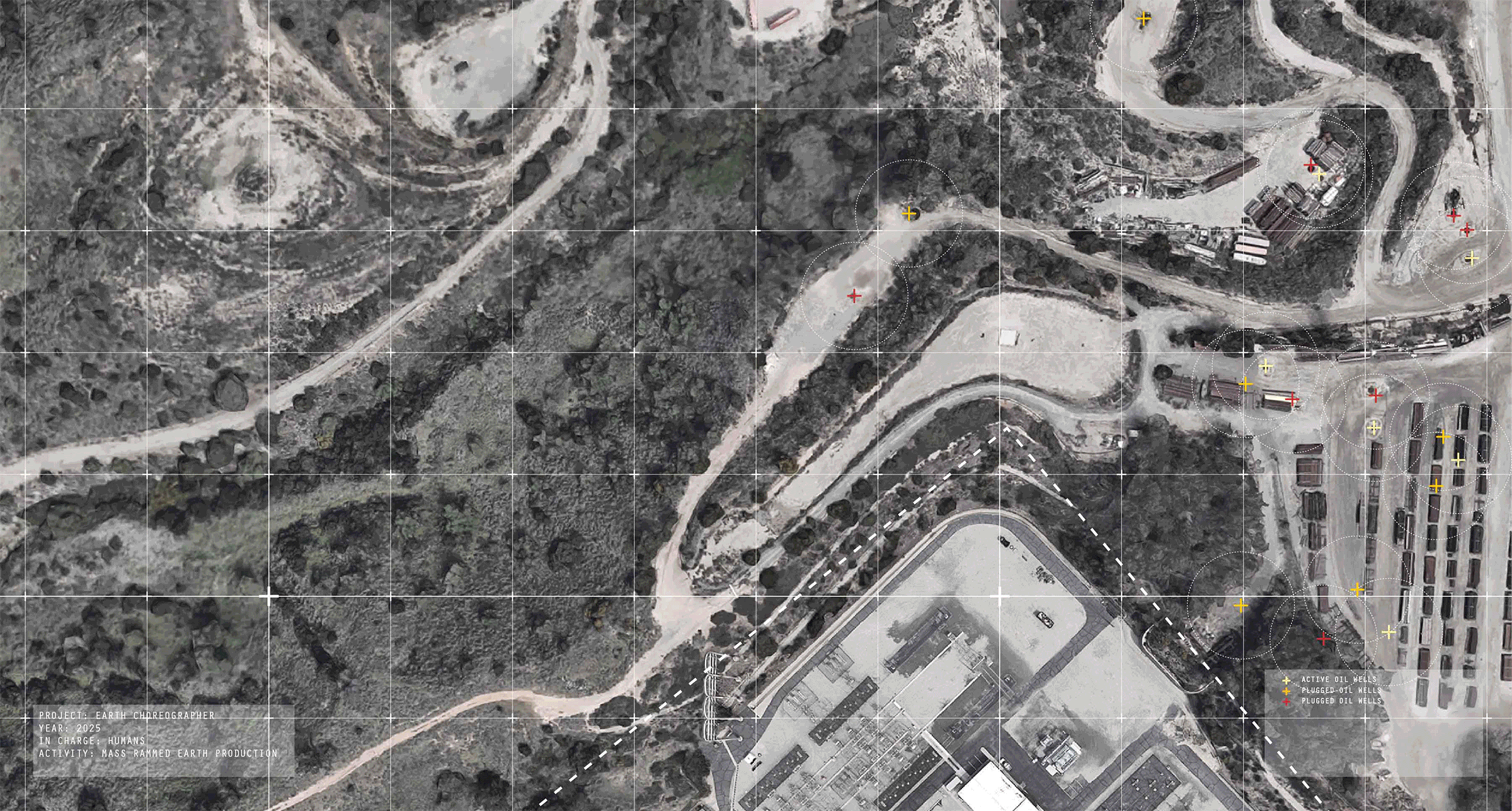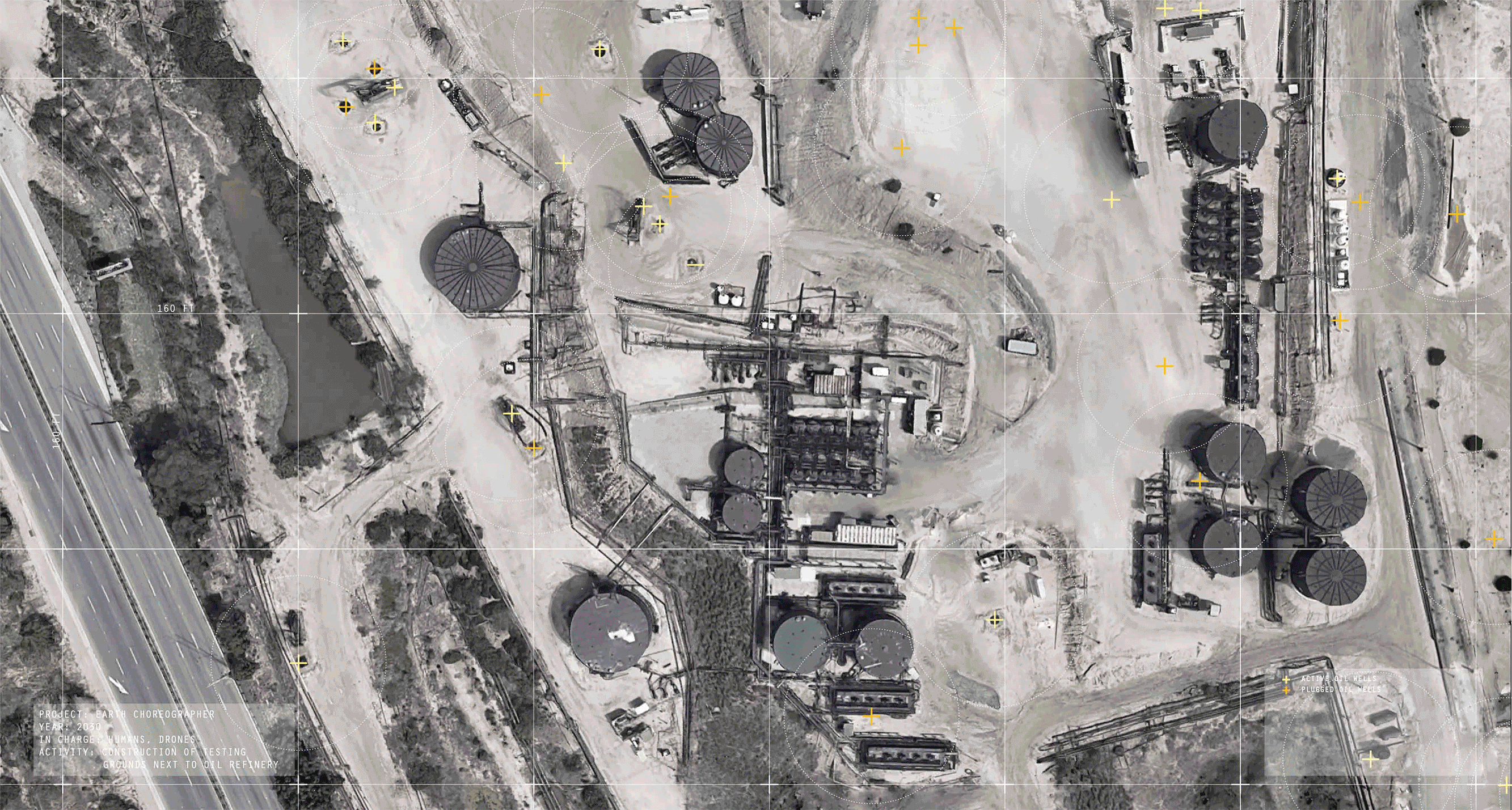WHAT ARE THE PARAMETERS OF DECISION MAKING?
1. TOXICITY / CONTAMINATION OF THE SOIL

THE MAP OF TOXICITY
After analyzing the contamination of the soil in the oil field, we located the distribution of the toxic soil caused by oil production activity.
2. SOIL QUALITY / STRATEGIES DEPLOYED
SOIL REMEDIATION STRATEGY


LIFE CYCLE OF SOIL AS RAMMED EARTH
An important goal of Earth Choreographer is to acknowledge the finite supply of the earth’s resources in terms of both extracted and raw materials. We, therefore, use already extracted soil on the site and convert it into rammed earth which will be our primary construction material.
CUT AND FILL DESIGN STRATEGY
Earth Choreographer deploys the “cut and fill” construction method. Instead of bringing the construction material from somewhere else, it will reutilize the excess soil that’s been extracted while drilling the oil wells and will turn it into rammed earth.


OIL WELL ENCAPSULATION STRATEGY
As we build around the properly capped wells, we will follow certain formal and material architectural strategies to avoid problems that might occur due to the close proximity of the existing wells. The oil well with a thick cover on its perimeter will thus start to act as a structural column. Keeping the existing wells and bringing them into our project as functional elements, is one of the architectural strategies we deploy.
3. PROGRAM
Earth Choreographer is intended to be an experimental testing ground targeted for future technology companies such as NASA, Tesla, and Autodesk which work on new technologies to replace the dependence on fossil fuels and resources in depletion.
We see this thesis as a prototype of a testing ground for these companies, where we think they will be best utilized. The testing ground will vary in scale and form depending on the type of space the companies need.

RAMMED EARTH RESEARCH LAB
for construction strategies

SOIL ANALYSIS LAB
for decontamination strategies

MAKERSPACE
for fabrication + mock-ups

GYM
converts kinetic energy into electric power

3D PRINTING SPACES
for rammed earth

SIMULATION LABS
for air mobility + drones
4. ACTORS
Both human and non human actors will work on the site. The actors and their tasks are choreographed accordinging to the specific tasks they are assigned to, however they will be working collaboratively towards constructing the testing grounds.


5. PHASING
This thesis proposes a constant reconfiguration of the oil field’s landscape which will be reclaimed parcel by parcel as it becomes available and it will continue growing and extending in phases over the coming decades.
We investigate the ideas of continuous reformatting through a site under permanent construction, reconfiguration and deterritorialization of the ground by human and non-human agencies.
![phase-diagrams-[Recovered]-01.gif](https://static.wixstatic.com/media/5a72ac_2d0f0c7eaae14174bd4b309df2dfc67b~mv2.gif)
--- THE CHOREOGRAPHY ---

The order of the choreography will be presented chronologically to show the constant change of the site. The speculation for choreographing the earth starts in 2025 which begins from the most populated areas of capped wells, farthest from the active ones.

PROJECTION : YEAR 2025

Earth Choreographer deploys the “cut and fill” construction method. Instead of bringing the construction material from somewhere else, it will reutilize the excess soil that’s been extracted while drilling the oil wells and will turn it into rammed earth.

The first frame of the gif starts with the original state of the site and shows the progression of the landscape. The lines layer the topographic, geographic and temporal mechanical information. With each phase, new lines are introduced to represent the new actors starting to play out in this process.

As of 2020, there is a significant number of idle wells on the site that are not yet properly capped. As they might be emitting toxins to the soil, Earth Choreopgrapher will deploy a combination of physical, biological, and chemical strategies in order to decontaminate the soil and plug the well.

PROJECTION : YEAR 2030
INGLEWOOD OIL FIELD

In 2030, we are relocating to the testing grounds in close proximity to the existing oil refinery. Although we will ultimately reclaim the whole site, some oil infrastructures will remain untouched even after they will reach the end of their intended life cycle. One of the remediation strategies is keeping some of the obsolete energy infrastructure, in order to emphasize the juxtaposition between the past and the future.


As the oil field is permanently choreographed for its changing occupiers, a variety of robots, drones and machines will contribute to this process. Both human and non human actors will work on the site.
We argue that the reclamation of the site can be achieved through radical technological juxtapositions without having to be nostalgic. We seek to reveal the traces that this obsolete oil infrastructure has left behind on the site.

PROJECTION : YEAR 2040

This area depicts the existing recreational park on the right and the productive landscape on the left hand side. We propose a more sustainable energy production facility placed adjacent to the existing oil infrastructure - creating a tension between old and new energy production facilities.

The ground becomes the medium for negotiating the energy production below and above the ground. Above the ground, there is the juxtaposition between the active recreational park and the heavy industrial construction site. So this leads us to investigate how to deal with the boundary of public active spaces in close proximity to construction sites and how we sustain a boundary between human and non human actors.

Above, there is harnessing of solar energy and a gym converting kinetic energy into electric power with stationary bikes, while below we see traces of the obsolete oil infrastructure. These traces of past and future energy sources collide and entangle at the surface of the Earth.

PROJECTION : YEAR 2060

By the year of 2060, We expect Earth Choreographer to have less people involved in the construction field. With the evolving robotic and AI technologies, we will see a shift from physical human labor to robotics in the construction industry. Most of the human labor will be shifted towards maintaining drones and robots which will be programmed to work in teams to build structures using rammed earth.

This shift of labor on the construction site, draws attention to the scarcity of humans in this project and in the construction industry and addresses the question of how the relationship between human and non human is choreographed in this construction site and what are the new interactions among them.

The oil wells will be properly covered to act as structural columns. Keeping the existing wells and bringing them into our project as functional elements is one of the architectural strategies we deploy.

PROJECTION : YEAR 2080
In 2080, we relocate ourselves to an area right next to the city fabric. Here, the form of the building is designed to allow some parts of this testing ground to be partially exposed to the public, which allows those future technology companies to be transparent to a certain extent.


The form of the testing grounds follows the location of existing wells and topography which has been already altered and traced by the oil production industry.
The goal of our design methodology is to provide plasticity and malleability enabling the form to adapt to different programmatic needs over decades.
Earth choreographer is heavily influenced by a dynamic design methodology and acts as a prototype by constantly evolving and changing over time based on the needs and interests of its occupiers. By emphasizing a temporal-situational design methodology, Earth choreographer brings a kinetic response to obsolete sites. It becomes a pivotal speculation for radically remediating and reprogramming obsolete landscapes of the future.